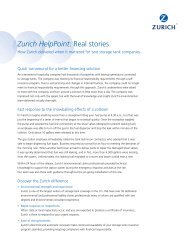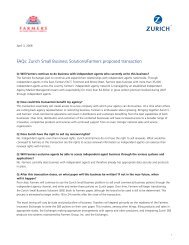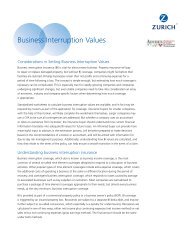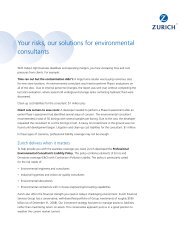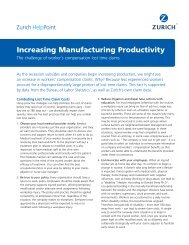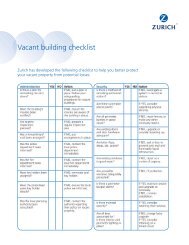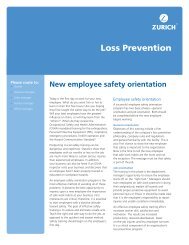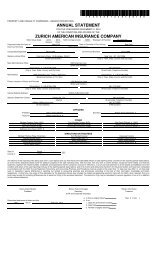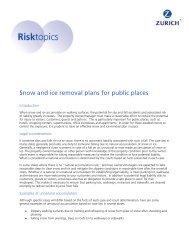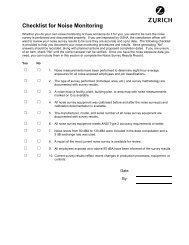The liability exposures of nonprofit board members The ... - Zurich
The liability exposures of nonprofit board members The ... - Zurich
The liability exposures of nonprofit board members The ... - Zurich
Create successful ePaper yourself
Turn your PDF publications into a flip-book with our unique Google optimized e-Paper software.
<strong>The</strong> <strong>liability</strong> <strong>exposures</strong><br />
<strong>of</strong> nonpr<strong>of</strong>it <strong>board</strong> <strong>members</strong><br />
Are the directors & <strong>of</strong>ficers <strong>of</strong> your organization protected?
<strong>The</strong> <strong>liability</strong> <strong>exposures</strong><br />
<strong>of</strong> nonpr<strong>of</strong>it <strong>board</strong> <strong>members</strong><br />
Are the directors & <strong>of</strong>ficers <strong>of</strong> your<br />
organization protected?<br />
Volunteering to sit on a <strong>board</strong> <strong>of</strong> directors for a nonpr<strong>of</strong>it organization is not<br />
as simple and straightforward as it used to be. Once thought <strong>of</strong> simply as an<br />
opportunity to make a difference, it has evolved into a position that potentially could<br />
threaten an individual’s livelihood and personal fortune.<br />
Claims against<br />
directors and <strong>of</strong>ficers<br />
tend to be costly<br />
and disruptive to an<br />
organization. Perhaps<br />
even worse, if found<br />
guilty <strong>of</strong> misconduct,<br />
<strong>board</strong> <strong>members</strong> could<br />
be personally liable,<br />
placing their individual<br />
assets at stake.<br />
<strong>The</strong> <strong>board</strong> <strong>of</strong> directors <strong>of</strong> a nonpr<strong>of</strong>it organization can be exposed to a variety <strong>of</strong><br />
lawsuits, ranging from allegations <strong>of</strong> wrongful acts to financial mismanagement<br />
to errors in judgment and negligence. Claims against directors and <strong>of</strong>ficers tend<br />
to be costly and disruptive to an organization. Perhaps even worse, if found guilty<br />
<strong>of</strong> misconduct, <strong>board</strong> <strong>members</strong> could be personally liable, placing their individual<br />
assets at stake. For this reason, directors and <strong>of</strong>ficers <strong>liability</strong> insurance (D&O) is an<br />
essential part <strong>of</strong> any <strong>board</strong> risk management program, providing financial resources<br />
for defense costs and any possible settlement.<br />
<strong>The</strong> primary objective <strong>of</strong> a nonpr<strong>of</strong>it <strong>board</strong> <strong>of</strong> directors is to provide oversight and<br />
direction to the organization so that it can successfully fulfill its mission. Although<br />
nonpr<strong>of</strong>it <strong>board</strong>s are typically not subject to the same level <strong>of</strong> scrutiny as those in the<br />
for-pr<strong>of</strong>it sector, they nonetheless owe fiduciary duties to the nonpr<strong>of</strong>it organization<br />
and its grantees and donors. Any perceived breach <strong>of</strong> these fiduciary responsibilities<br />
can lead to legal action. A D&O claim can be brought against a nonpr<strong>of</strong>it and<br />
its directors and <strong>of</strong>ficers for countless reasons; however, a few issues make up a<br />
majority <strong>of</strong> the claims. Some <strong>of</strong> the more common examples <strong>of</strong> nonpr<strong>of</strong>it D&O<br />
lawsuits are related to grants, fundraising and employment practices.<br />
Grants and fundraising<br />
Nonpr<strong>of</strong>its commonly rely on grants to account for at least part, if not all, <strong>of</strong> the<br />
funding for their annual budgets. Grants are provided by both the government as<br />
well as grant-making institutions (foundations). Competition to obtain grant money<br />
is always fierce. Questions and concerns about how the funding is being utilized<br />
are common and, in some instances, can result in legal action against the grant<br />
recipient. Foundations also owe a fiduciary duty to their donors and are subject to<br />
lawsuits as well.<br />
When applying for a grant, an organization should proceed with caution and weigh<br />
the requirements associated with the funding. Unfortunately, adequate program<br />
funding is not always easy to come by, and the pursuit <strong>of</strong> money can lead an<br />
organization into making promises that are both unreasonable and unattainable.<br />
If an organization is found to have mismanaged the grant funding and is sued,<br />
the repercussions could significantly affect the organization in three ways: legally,<br />
through civil litigation or criminal prosecution; publicly, through adverse publicity;<br />
and financially, through the revocation <strong>of</strong> the grant and loss <strong>of</strong> future funding.<br />
1<br />
<strong>The</strong> <strong>liability</strong> <strong>exposures</strong> <strong>of</strong> nonpr<strong>of</strong>it <strong>board</strong> <strong>members</strong>
An example <strong>of</strong> a lawsuit for misuse <strong>of</strong> grant funding is the case <strong>of</strong> the United States<br />
vs. Educational Broadcasting Corporation (EBC). EBC received multiple government<br />
grants through the National Science Foundation, the National Endowment for<br />
the Arts, and the National Endowment for the Humanities from 2001 through<br />
2008. Grant specifications required the funds be used only for expenses that were<br />
considered allowable and allocable, and specific documentation <strong>of</strong> expenses was to<br />
be kept. <strong>The</strong> United States conducted audits and determined that EBC comingled<br />
the federal funds with other money and used it to pay for costs not specified by<br />
the grant requirements. <strong>The</strong> United States filed a civil grant fraud lawsuit alleging<br />
violations <strong>of</strong> the False Claims Act. EBC agreed to pay $950,000 to the United States<br />
and to adopt a plan to assure future compliance.<br />
Fraud and financial oversight<br />
Nonpr<strong>of</strong>its, like their for-pr<strong>of</strong>it counterparts, are not immune to incidents <strong>of</strong> fraud.<br />
In fact, in recent years it seems that both the government and the media are paying<br />
more attention to the administrative activities <strong>of</strong> nonpr<strong>of</strong>its. A good example <strong>of</strong> a<br />
high-pr<strong>of</strong>ile incident involves one <strong>of</strong> the nation’s largest charitable organizations,<br />
“Feed the Children,” and its founder Larry Jones. In January 2011, the Oklahoma<br />
Attorney General announced a criminal investigation into the charity during Mr.<br />
Jones’ tenure. In this instance, nonpr<strong>of</strong>it <strong>board</strong>s may be held liable for the misuse <strong>of</strong><br />
grant money if they fail to implement proper controls or provide proper oversight to<br />
deter fraud.<br />
An example <strong>of</strong> a case where <strong>board</strong> <strong>members</strong> were sued for failing to provide proper<br />
oversight is a suit filed by the California Attorney General against the Monterey<br />
County AIDS Project (MCAP). <strong>The</strong> complaint alleges “mismanagement and neglect<br />
<strong>of</strong> present and former <strong>members</strong> <strong>of</strong> its <strong>board</strong> <strong>of</strong> directors.” It states that its directors,<br />
<strong>of</strong>ficers and key employees diverted and improperly distributed more than $2.8<br />
million <strong>of</strong> charitable assets. <strong>The</strong> complaint alleges there was a breach <strong>of</strong> fiduciary<br />
duty by the organization and its <strong>board</strong> for not properly managing and accounting<br />
for income received from the “Housing Endowment.” According to the complaint,<br />
MCAP comingled assets, failed to keep proper expense records, failed to identify<br />
improper spending, failed to account for all assets and failed to inquire about the<br />
questionable conduct <strong>of</strong> a few directors and <strong>of</strong>ficers.<br />
Not only are grant recipients subject to D&O suits, the foundations that make grants<br />
also may be targeted. Foundations are non-governmental organizations created as<br />
nonpr<strong>of</strong>it corporations or charitable trusts. <strong>The</strong>y have a primary purpose <strong>of</strong> providing<br />
grants for a variety <strong>of</strong> different causes. Two types <strong>of</strong> foundations exist: private<br />
foundations that receive money from an individual, a family or a corporation and<br />
public foundations that receive support from various sources including individuals,<br />
families and government agencies. <strong>The</strong>se nonpr<strong>of</strong>it organizations are also overseen<br />
by a <strong>board</strong> <strong>of</strong> directors that can be named in D&O lawsuits. Common accusations<br />
are by grant recipients for not following through with promised funding or by<br />
donors for perceived misappropriation <strong>of</strong> assets.<br />
Fundraising is an essential source <strong>of</strong> revenue for many nonpr<strong>of</strong>its. <strong>The</strong> various ways<br />
to raise funds include special events, using the Internet and social media, soliciting<br />
endowment gifts, etc. For some organizations, fundraising is its primary source <strong>of</strong><br />
2 <strong>The</strong> <strong>liability</strong> <strong>exposures</strong> <strong>of</strong> nonpr<strong>of</strong>it <strong>board</strong> <strong>members</strong>
evenue and for others it is a way to provide an additional financial boost so it can<br />
fulfill its mission and provide for its employees; however, similar to the accountability<br />
required as a grant recipient, an organization is also accountable to private donors<br />
who want to be sure their donations are being used responsibly.<br />
Entrusted with charitable funds, the <strong>board</strong> <strong>of</strong> directors is responsible for developing<br />
a budget, establishing financial policies and diligently reviewing information as<br />
it pertains to the financial position <strong>of</strong> the organization. With the proper financial<br />
processes and procedures in place, the likelihood <strong>of</strong> an incident or allegation <strong>of</strong><br />
fraud will be greatly diminished.<br />
Employment practices<br />
Employment practice<br />
<strong>liability</strong> (EPL) claims<br />
are the leading cause<br />
<strong>of</strong> D&O claims against<br />
nonpr<strong>of</strong>its and account<br />
for a significant portion<br />
<strong>of</strong> the overall <strong>liability</strong><br />
issues that they face.<br />
Nonpr<strong>of</strong>it D&O insurance policies typically include insurance protection for<br />
employment-related claims. Employment practice <strong>liability</strong> (EPL) claims are the leading<br />
cause <strong>of</strong> D&O claims against nonpr<strong>of</strong>its and account for a significant portion <strong>of</strong><br />
the overall <strong>liability</strong> issues that they face. According to the U.S. Equal Employment<br />
Opportunities Commission (EEOC), there were 99,922 total charges <strong>of</strong> discrimination<br />
in the United States in 2010 against for-pr<strong>of</strong>it and nonpr<strong>of</strong>it organizations. <strong>The</strong>se<br />
are claims <strong>of</strong> actual and alleged acts <strong>of</strong> discrimination, harassment, retaliation and<br />
wrongful termination.<br />
Since the 1991 amendments to the Civil Rights Act, which gave employees the<br />
ability to seek jury trials and punitive damages for mental anguish and emotional<br />
distress, employment-related lawsuits have become a serious concern for both forpr<strong>of</strong>it<br />
and not-for-pr<strong>of</strong>it organizations. With increasingly high costs to defend, settle<br />
and pay compensatory awards, the need for EPL protection is especially imperative<br />
for cash-strapped organizations and their <strong>board</strong>s.<br />
<strong>The</strong> potential high costs associated with employment practice lawsuits can be seen in<br />
an example <strong>of</strong> a nonpr<strong>of</strong>it that terminated an executive for continuous complaints by<br />
employees <strong>of</strong> sexual misconduct and harassment. <strong>The</strong> executive responded by suing<br />
the nonpr<strong>of</strong>it for wrongful termination and the <strong>board</strong> <strong>of</strong> directors for interference<br />
with contractual relations. After a drawn-out legal process that included multiple<br />
appeals, the nonpr<strong>of</strong>it’s defense was successful, but the total cost <strong>of</strong> defending the<br />
claim exceeded $250,000.<br />
Employment practice <strong>liability</strong> insurance provided by most non-pr<strong>of</strong>it D&O policies is<br />
a necessity, but it should not be the only defense against EPL suits. Organizational<br />
risk management strategies should be in place to help prevent claims from occurring.<br />
<strong>The</strong>y should start with the <strong>board</strong> <strong>of</strong> directors, who should question the executive<br />
director and other managers about employment policies and whether they are being<br />
applied consistently and uniformly throughout the organization. <strong>The</strong> <strong>board</strong> should<br />
establish employment-related policies, develop a system for determining how well<br />
the policies are being followed, and identify what actions are being taken to prevent<br />
situations where the organization can be potentially liable.<br />
3<br />
<strong>The</strong> <strong>liability</strong> <strong>exposures</strong> <strong>of</strong> nonpr<strong>of</strong>it <strong>board</strong> <strong>members</strong>
In closing<br />
<strong>The</strong> <strong>liability</strong> risks associated with nonpr<strong>of</strong>it <strong>board</strong>s are real and ever-changing. At one<br />
time, charitable organizations were perceived as the “good guys,” and lawsuits were<br />
comparatively uncommon. That situation has changed. Heightened transparency,<br />
accountability and a more litigious society mean that nonpr<strong>of</strong>its and their <strong>board</strong><br />
<strong>members</strong> are increasingly susceptible to lawsuits. To maintain the health <strong>of</strong> the<br />
organization and security <strong>of</strong> its <strong>board</strong> <strong>members</strong>, every nonpr<strong>of</strong>it should consider a<br />
comprehensive D&O insurance policy as part <strong>of</strong> their overall insurance program.<br />
In the not-so-distant past, it was difficult for many nonpr<strong>of</strong>its to obtain affordable<br />
D&O insurance. Fortunately those days are history, and the protection is readily<br />
available and accessible. D&O insurance is not a one-size-fits-all product, and the<br />
extent <strong>of</strong> protection can vary based upon the limitations and exclusions listed in<br />
the policy. Because <strong>of</strong> this, the nonpr<strong>of</strong>it and its <strong>board</strong> should work closely with an<br />
agent or broker to assure the proper coverage is provided at a reasonable price. In<br />
an industry where every penny can make a difference, the peace <strong>of</strong> mind that the<br />
organization is adequately protected is priceless.<br />
Why <strong>Zurich</strong>?<br />
<strong>Zurich</strong> has been providing management solutions for more than two decades –<br />
and our <strong>Zurich</strong> Not-for-Pr<strong>of</strong>it Select, built <strong>of</strong>f our current corporate directors &<br />
<strong>of</strong>ficers (D&O) policy, <strong>of</strong>fers a flexible suite <strong>of</strong> four coverages created to respond to<br />
today’s challenging environment. Coverages include management and entity <strong>liability</strong><br />
(traditional D&O coverage), employment practices and third party discrimination<br />
<strong>liability</strong>, fiduciary <strong>liability</strong> and crime. Our comprehensive <strong>of</strong>fering has the flexibility<br />
to respond to stand-alone coverage needs or respond as one seamless suite <strong>of</strong><br />
coverages depending on each organization’s requirements.<br />
<strong>Zurich</strong>’s integrated claims model <strong>of</strong>fers a dedicated and single point-<strong>of</strong>-contact for all<br />
our D&O customers during the claims process – helping to respond to their unique<br />
needs. Plus, our robust international platform enables us to address an insured’s<br />
stateside exposure and international footprint in 180 countries and territories.<br />
For more information on <strong>Zurich</strong>’s Not-for-Pr<strong>of</strong>it Select insurance policy:<br />
• visit us on the web at www.zurichna.com/middlemarketdando<br />
• reach out to your regional <strong>Zurich</strong> representative,<br />
• or call us at 866-860-7292<br />
4 <strong>The</strong> <strong>liability</strong> <strong>exposures</strong> <strong>of</strong> nonpr<strong>of</strong>it <strong>board</strong> <strong>members</strong>
A1-19838-A (04/11) 11-1143<br />
<strong>Zurich</strong><br />
One Liberty Plaza, New York, New York 10006<br />
866 860 7292 www.zurichna.com<br />
This is intended as a general description <strong>of</strong> certain types <strong>of</strong> insurance and services available to qualified<br />
customers. Coverages are underwritten by individual member companies <strong>of</strong> <strong>Zurich</strong> in North America, including<br />
<strong>Zurich</strong> American Insurance Company. Certain coverages are not available in all states. Some coverages may<br />
be written on a nonadmitted basis through licensed surplus lines brokers. Your policy is the contract that<br />
specifically and fully describes your coverage. <strong>The</strong> description <strong>of</strong> the policy provisions gives a broad overview <strong>of</strong><br />
coverages and does not revise or amend the policy.<br />
<strong>The</strong> information in this publication was compiled from sources believed to be reliable for informational<br />
purposes only. Any and all information contained herein is not intended to constitute legal advice and<br />
accordingly, you should consult with your own attorneys when developing programs and policies. We do not<br />
guarantee the accuracy <strong>of</strong> this information or any results and further assume no <strong>liability</strong> in connection with this<br />
publication.<br />
©2011 <strong>Zurich</strong> American Insurance Company



